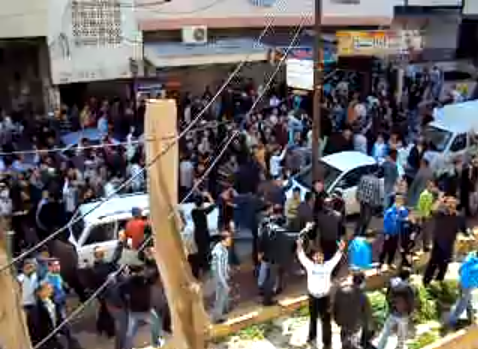The Alawites’ Curse: “Our Sin Is That We Belong to The Same Sect As The President”

Raheel Ibrahim
A story is circulating among the people of Burjan, a village south of the coastal city of Jablah. It is the story of Abu Jaafar who went to Jablah when a family he knew was blessed with a baby boy. But this visit was not like any regular visit just to celebrate the birth of a child. Abu Jaafar believed that his son, who had been a soldier in the regime’s army and was killed a month ago in Aleppo, had been reborn in the body of the boy. When the boy grew up, Abu Jaafar would tell him the story of his death.

Perhaps the Alawites’ belief in reincarnation is what allows them to continue to bear the brunt of the regime’s war, which shows no signs of ending soon. The people of Jablah and the surrounding villages know this better than anyone; Jablah has become known as the “city of three thousands martyrs,” but even this sacrifice is dwarfed by their fear of the future should the regime fall.
“Our only sin is that we belong to the same sect as the president,” said Abu Mohammed (not his real name), an employee at the public veterinary clinic in Jablah. “We know that as Alawites we have been oppressed by this same regime. We know that we were the fuel ready to be lit when needed during the crisis. In full knowledge of all this, we declare that we are committed to this regime till death, and are ready to sacrifice a million martyrs to avoid total annihilation.”
Abu Mohammad’s fears were echoed by multiple Alawites who spoke to The Damascus Bureau, saying they depend on the regime to protect them from the Sunni majority.
“We will cease to exist if Bashar al-Assad goes; he represents for us a source of protection and safety, and if his no longer president we will return to the time of the Umayyads and the Abbasids, all the way down to the Ottomans,” said Mustafa (not his real name), an Arabic teacher from Jablah.
“The Alawites are hidden away in the coastal mountains,” he continued. “Since the beginning of the uprising, we have seen many families move permanently from Damascus to their villages on the coast.”
The community’s fears have been compounded by news of killings and harassment of Alawite women in Damascus and Homs.
Ola said she even assumed a disguise for the journey from Damascus to Tartous.
“My husband forces me to wear the veil for fear I would be kidnapped, but I take it off when I get to my village,” she said. Most Alawite women do not wear the veil.
“Identity-card killings have shown us that this conflict is sectarian first and foremost and that we are being targeted as a community,” said Ahmed, who joined the ranks of the Syrian army reserves. “We cannot forget how supporters of the revolution divided Alawites. The good Alawites were the ones who supported the revolution, while others were included on the list of shame because they were with the regime.”
Ahmed said he fears the dismantling of the army, the Alawites’ only protection, if the rebels win the war.
“We consider these divisions an explicit threat to our future,” he said. “We believe that the army will be dismantled if the regime falls, but perhaps they will not be satisfied with dismantling it. We are afraid they will take revenge.”
There are virtually no manifestations of anti-regime sentiment in the coastal region of Latakia, which includes the president’s hometown of Qardaha and remains firmly under government control.
While Jablah other areas in the coast witnessed a series of large demonstrations in March 2011, the most notable protests on the coast took place in the city of Banyas and the surrounding villages, a largely Sunni area. The army and security forces were able to squash these protests during the spring of 2011.
Those young Alawite men and women who did support the opposition have long since left their towns and villages, heading either to Damascus or fleeing the country due to the harassment they faced from their community. If any remain, they do not reveal their politics.
Criticism of the president was muted among the Alawites who spoke to The Damascus Bureau.
“You cannot compare the son to the father,” said Nidal (not his real name), a pro-regime doctor who moved his family to Latakia from Damascus at the outbreak of the crisis.
“Hafez al-Assad made a name for the Alawites; he gave them a position and they became the state, therefore we cannot renounce this regime, even if we wanted to–we cannot disown our families,” he said, gazing at the picture of the young president hung on the living room wall.
The way Nidal spoke about the crisis, it is as if the Alawites are under a curse which binds their own survival to that of the regime.
“Most coastal villages depend on their sons who are serving in the army and security forces,” Nidal explained. “It is not uncommon for three brothers from the same family to volunteer for the police or a security institutions.”
“The future for us looks bleak,” he concluded. “We are bound to the regime in our marrow, and any [change] will be catastrophic.”
